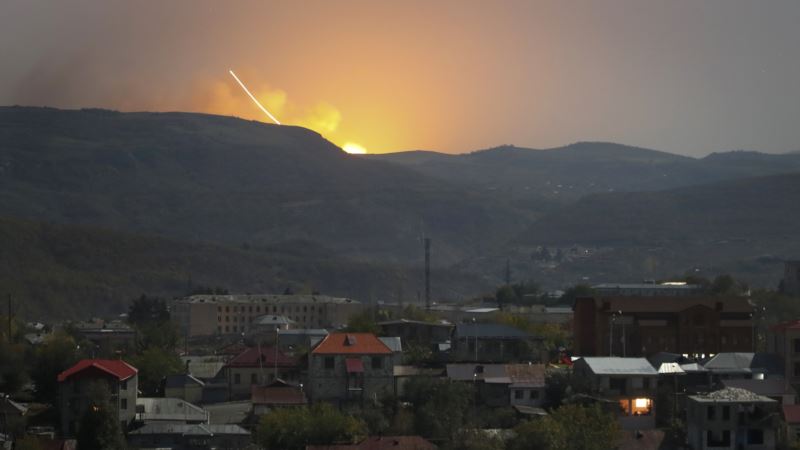
YEREVAN/BAKU — Talks between the top diplomats of Azerbaijan and Armenia and international mediators have begun in Geneva as the parties look for a deal strong enough to bring a halt to fighting over the breakaway region of Nagorno-Karabakh after three previous cease-fires failed.
Armenian Foreign Minister Zohrab Mnatsakanian opened the session on October 30, meeting with the Minsk Group mediation co-chairs – Russia, France and the United States — before his Azerbaijani counterpart, Ceyhun Bayramov, holds a separate session with the international diplomats.
It was not clear whether Mnatsakanian and Bayramov would meet face-to-face.
The talks were supposed to take place a day earlier but were delayed when fighting once again spiked in Nagorno-Karabakh, a territory recognized as part of Azerbaijan but controlled by ethnic Armenians, as well as surrounding areas controlled by Armenian forces.
The current clashes broke out on September 27 and fighting has persisted despite three cease-fire agreements that unraveled as quickly as they were agreed.
Azerbaijan said on October 29 that it had handed over to Armenia the bodies of 29 servicemen killed in the ongoing fighting as the death toll mounted.
The handover was acknowledged by both sides as Yerevan and Baku continued to blame each other for the collapse of the most recent cease-fire, which was brokered by the United States.
The Minsk Group has said the Geneva meeting would “discuss, reach agreement on, and begin implementation, in accordance with a timeline to be agreed upon, of all steps necessary to achieve a peaceful settlement of the Nagorno-Karabakh conflict.”
Nagorno-Karabakh is recognized as part of Azerbaijan, but the ethnic Armenians who make up most of the population reject Azerbaijani rule. They have been governing their own affairs, with support from Armenia, since Azerbaijan’s troops were pushed out of the breakaway region in a war in the early 1990s.
President Ilham Aliyev has demanded that Nagorno-Karabakh be returned to Azerbaijan, as well as seven surrounding districts controlled by Armenian forces.
Armenia says it will not withdraw from territory it views as part of its historic homeland and where the population needs protection.
The conflict has sparked concerns over a wider conflict in the South Caucasus drawing in NATO member Turkey, which is an ally of Azerbaijan, and Russia, which has a military pact with Armenia.
Turkey has demanded a bigger role in the Minsk Group, which Ankara and Baku say has sidelined the Nagorno-Karabakh issue for decades without finding a lasting solution.
Turkey is not the only regional player with an eye on the conflict.
Iran has also warned the warring parties against threatening the security of nearby Iranian territories.
Earlier this week, Tehran announced it had drawn up a plan to resolve the Nagorno-Karabakh conflict in the hope of stopping fighting between Armenian and Azerbaijani forces continuing along its northwestern border.
The European Union, meanwhile, has called the escalation in fighting “unacceptable” and wants new peace talks.
